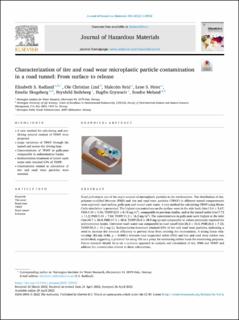| dc.contributor.author | Rødland, Elisabeth Strandbråten | |
| dc.contributor.author | Lind, Ole Christian | |
| dc.contributor.author | Reid, Malcolm James | |
| dc.contributor.author | Heier, Lene Sørlie | |
| dc.contributor.author | Skogsberg, Emelie | |
| dc.contributor.author | Snilsberg, Brynhild | |
| dc.contributor.author | Gryteselv, Dagfin | |
| dc.contributor.author | Meland, Sondre | |
| dc.date.accessioned | 2022-07-13T10:19:59Z | |
| dc.date.available | 2022-07-13T10:19:59Z | |
| dc.date.created | 2022-05-12T09:35:41Z | |
| dc.date.issued | 2022 | |
| dc.identifier.citation | Journal of Hazardous Materials. 2022, 435, 129032. | en_US |
| dc.identifier.issn | 0304-3894 | |
| dc.identifier.uri | https://hdl.handle.net/11250/3005017 | |
| dc.description.abstract | Road pollution is one of the major sources of microplastic particles to the environment. The distribution of tire, polymer-modified bitumen (PMB) and tire and road wear particles (TRWP) in different tunnel compartments were explored: road surface, gully-pots and tunnel wash water. A new method for calculating TRWP using Monte Carlo simulation is presented. The highest concentrations on the surface were in the side bank (tire:13.4 ± 5.67;PMB:9.39 ± 3.96; TRWP:22.9 ± 8.19 mg/m2), comparable to previous studies, and at the tunnel outlet (tire:7.72 ± 11.2; PMB:5.40 ± 7.84; TRWP:11.2 ± 16.2 mg/m2). The concentrations in gully-pots were highest at the inlet (tire:24.7 ± 26.9; PMB:17.3 ± 48.8; TRWP:35.8 ± 38.9 mg/g) and comparable to values previously reported for sedimentation basins. Untreated wash water was comparable to road runoff (tire:38.3 ± 10.5; PMB:26.8 ± 7.33; TRWP:55.3 ± 15.2 mg/L). Sedimentation treatment retained 63% of tire and road wear particles, indicating a need to increase the removal efficiency to prevent these from entering the environment. A strong linear relationship (R2-adj=0.88, p < 0.0001) between total suspended solids (TSS) and tire and road wear rubber was established, suggesting a potential for using TSS as a proxy for estimating rubber loads for monitoring purposes. Future research should focus on a common approach to analysis and calculation of tire, PMB and TRWP and address the uncertainties related to these calculations. | en_US |
| dc.language.iso | eng | en_US |
| dc.publisher | Elsevier | en_US |
| dc.rights | Navngivelse 4.0 Internasjonal | * |
| dc.rights.uri | http://creativecommons.org/licenses/by/4.0/deed.no | * |
| dc.title | Characterization of tire and road wear microplastic particle contamination in a road tunnel: From surface to release | en_US |
| dc.title.alternative | Characterization of tire and road wear microplastic particle contamination in a road tunnel: From surface to release | en_US |
| dc.type | Peer reviewed | en_US |
| dc.type | Journal article | en_US |
| dc.description.version | publishedVersion | en_US |
| dc.rights.holder | © 2022 The Author(s) | en_US |
| dc.source.pagenumber | 11 | en_US |
| dc.source.volume | 435 | en_US |
| dc.source.journal | Journal of Hazardous Materials | en_US |
| dc.identifier.doi | 10.1016/j.jhazmat.2022.129032 | |
| dc.identifier.cristin | 2023771 | |
| dc.relation.project | Norges forskningsråd: 160016 | en_US |
| dc.relation.project | Norges forskningsråd: 223268 | en_US |
| dc.source.articlenumber | 129032 | en_US |
| cristin.ispublished | true | |
| cristin.fulltext | original | |
| cristin.qualitycode | 2 | |

